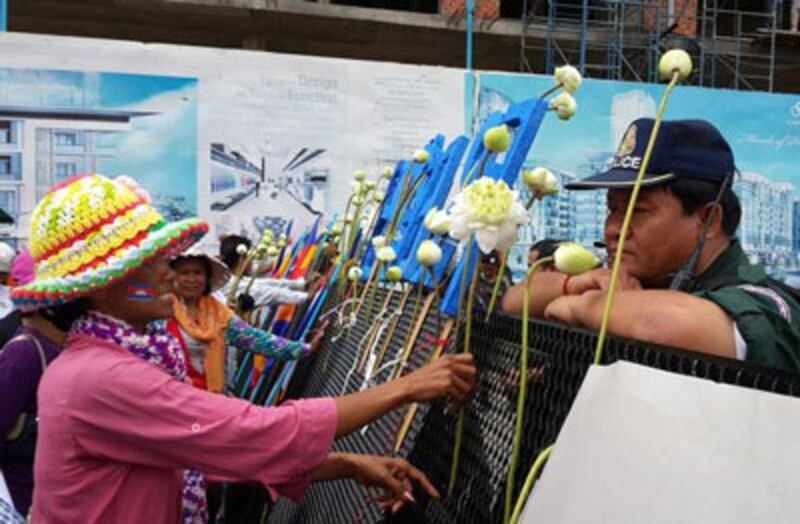A court in Phnom Penh put off for the second time Tuesday the trial of 23 Cambodians arrested during a deadly worker strike crackdown, drawing criticism from rights groups who said the move was politically motivated.
After a five-hour hearing, with hundreds of riot police manning barricades as dozens of supporters and relatives gathered outside the Phnom Penh Municipal Court, presiding Judge Keo Mony ruled that proceedings be adjourned until May 20 to provide for further review of evidence.
The 23 have been waiting to defend themselves in court since their arrest following a January crackdown on an opposition Cambodia National Rescue Party (CNRP)-backed strike by workers demanding higher wages, which left five people dead and nearly 40 wounded.
Their trial had begun in late April but was put off after a day of proceedings when Keo Mony also ruled on the need for a further review of evidence due to the severity of the charges they are facing, which include causing intentional violence and damaging property during the strikes.
All 23 face up to five years’ imprisonment as well as fines from U.S. $1,000 to $2,500.
Am Sam Ath, senior investigator with local rights group Licadho, said that the court is aligned with Prime Minister Hun Sen’s ruling Cambodian People’s Party (CPP) and has unfairly tied the fate of the 23 men to the party’s ongoing political deadlock with the CNRP over disputed elections in July.
“Politicians should resolve their political problems among themselves—they shouldn’t use villagers as leverage,” he said, suggesting the defendants were being used as pawns by the ruling party to exact concessions out of the opposition.
“The judges must maintain independence. The people are watching the court, and if the court is unjust there will be no confidence that the judicial system is independent.”
The CPP and CNRP had resumed negotiations recently to end the political stalemate following July 2013 elections but the talks failed to achieve a breakthrough.
The CNRP has boycotted parliament following the elections in which the CPP was declared the victor despite allegations of widespread irregularities. The opposition party had been holding protests calling for Hun Sen’s resignation until a ban on street rallies was imposed after the January crackdown.

Proceedings
Tuesday’s trial began early with the defendants separated into three chambers, including one in which judges questioned president of the Independent Democratic Association of Informal Economy and government critic Vorn Pov, as well as nine others arrested on Jan. 2 at the Yak Jin factory in Phnom Penh, where the strike took place.
Judges repeatedly asked the accused questions which implied their blame and echoed the line of inquiry used by the prosecution, according to nongovernmental organizations which—along with foreign diplomats—made up the limited number of monitors permitted to observe the proceedings.
The defendants said that they were not involved in the destruction of property at Yak Jin and also denied accusations that they had known and plotted with Vorn Pov prior to the protest at the factory.
At one point, deputy prosecutor Ly Sophana displayed a picture of defendant Sokun Sambath Piseth—an NGO worker—saying that it proved he had been taking part in protests at Yak Jin on Jan. 2.
Sokun Sambath Piseth said that he was monitoring the strike for a rights organization and suggested that the photo might have been doctored to help convict him, adding that he did not trust evidence from the authorities.
Ly Sophana denied that the photo had been altered and Judge Keo Mony agreed, saying the deputy prosecutor had “nothing to gain” from doing so.
During a heated exchange, prison guards stepped in—much like they did in late April—and asked the judge to adjourn the hearing in the interest of the defendants’ security and in order to transfer them safely back to Prey Sar Prison, where they are being held.
The judge granted the request and explained that the trial would resume in two weeks’ time.
As they left the court, one of the defendants criticized a few security personnel who had been present during the January crackdown, saying that they would lose spiritual merit for what they had done to the striking workers.
Delay
Despite the frustration that supporters and rights groups have expressed over the delays to the trial proceedings, defense lawyer Sam Sokong suggested that the second adjournment could benefit the accused.
“The court adjourned the trials to May 20 because it needs more time to examine documents and evidence,” China’s official Xinhua news agency quoted him as saying after the hearing.
“The adjournment is good for both the court and the defendants—they will have enough time to find additional documents.”
But Vorn Pov, who is suffering from kidney problems and was denied bail on four occasions between Jan. 13 and April 4 despite what rights groups have said is a “need [for] urgent medical treatment,” was less optimistic.
Before leaving the court Tuesday, he said he was disappointed by the judge’s ruling, adding that his health is “deteriorating” inside Prey Sar Prison.
“Today, I need freedom and justice to allow me to receive the medical attention I need to survive and help our country,” he said, vowing to continue his activism after his release.
Two of the 23 had received bail and were discharged from detention following a closed-door hearing in February, though authorities gave no reason for their release.
The remaining 21 were denied bail on grounds of posing a threat to public security, despite a deluge of appeals from local and international groups for their release.
Reported by Vann Vicha for RFA’s Khmer Service. Translated by Samean Yun. Written in English by Joshua Lipes.
